Swimming For Freedom By Tera Bradham: A Stirring Story of Faith, Hope And Victory
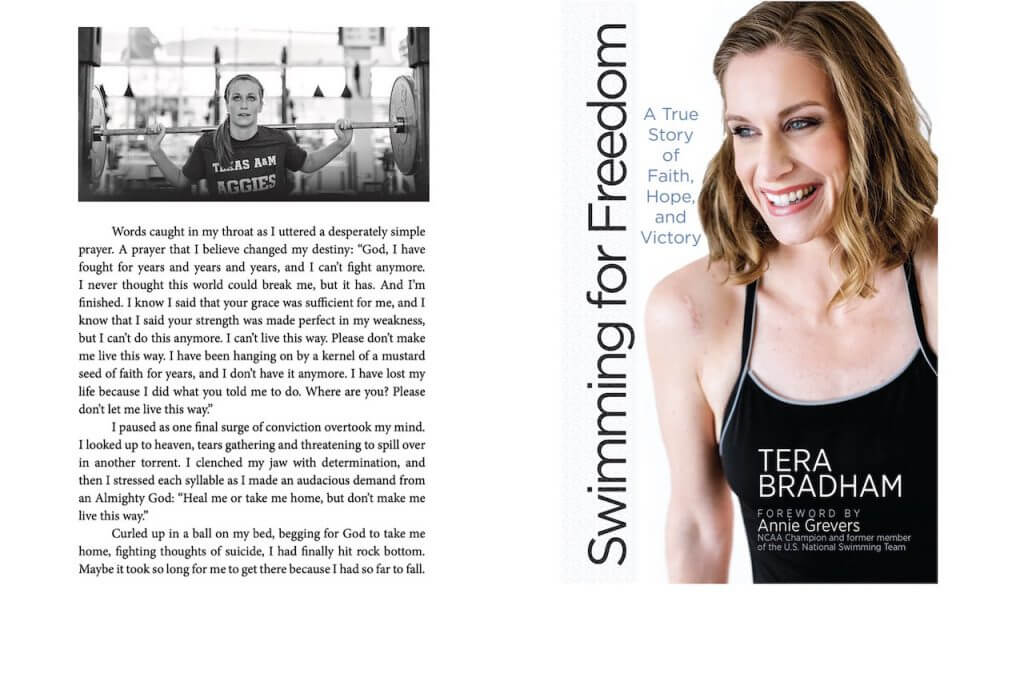
At times, the joy, boundless energy, determination and indestructible spirit of Tera Bradham leap from the pages of her debut book Swimming for Freedom. There are also moments of excruciating pain, sorrow, and that dead-weight, sinking feeling that comes with the realisation that what was worked for, what was made a goal, what was given “your all” to, what the heart and your sights and hopes and dreams were set on, will, after all, not be the “soaring success” of your life.
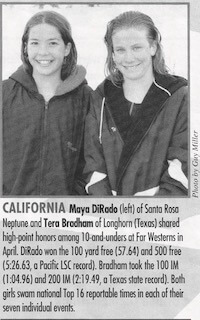
Young winners Tera Bradham, right, and Maya DiRado – Photo Courtesy: Swimming World Magazine
“Only in the darkness can you see the stars,” said Martin Luther King Jr. The tale of “Tera the Terror”, youth swim champion, contemporary of Maya DiRado and later Texas A&M University teammate and Swimming World Intern, is summed up in the sub-title: “A True Story of Faith, Hope and Victory“.
William Wordsworth described faith as “a passionate intuition”. One that takes us on a journey of many twists and turns and challenges, highs and lows throughout life. One gets a sense of that in the first chapter of her book, which we publish, with permission, below, but the work is more slow burn and better soaked up than dipped into.
Full of the colour and details of the life of a young competitive swimmer, Tera Bradham’s Swimming For Freedom, out today, takes us deeper than that: she explores her thoughts, motives, response to challenges, travels a roller-coaster of self-discovery and skips, hops and jumps along the blade of a learning curve travelled a pace that preaches patience but a tempo that tolerates no dragging of heels, let alone a hole in the lung and a shoulder under knife.
At times, the sound of slamming doors is more than she can bear. Enter her relationship with faith, from first date to successful marriage. In Tera Bradham’s last reflections in the book, we read this:
“I was not born to prove people wrong. I was born to be set free and to set others free in the process. I didn’t get my horse after all. I never made the Olympic team; by swimming’s standards, I didn’t even come close. I don’t ride Freedom through the fields of Texas. Instead, I live my freedom. What started as an Olympic dream ended in the discovery of the truest freedom: the ability to live above the expectations and realities of the world in the way that God originally intended. I can watch every Olympics with joy, enjoying the success of others, because I know I have a freedom that isn’t found on a podium. It isn’t found in sports, hobbies, or even relationships. True freedom is found in Christ alone.”
The Enemy Within
Back in 2015, Tera Bradham wrote one of the most popular articles of the season as a Swimming World intern under the headline “You Are Defined by the Bad Days” – replicated today. She now lives that truth in Swimming for Freedom.
A champion in her youth, Bradham became known to her peers and coaches as Tera The Terror, such was the depth of her determination to succeed.
Her mother once tried to comfort her after she’d finished second in a race by telling her “what an incredible accomplishment it was to be the second-fastest swimmer in the state of Texas”. As Bradham notes: ” … her message fell on deaf ears.
“I was inconsolable. My eyes burned with tears of embarrassment that night as I refused to let go of the defeat. The next day, I returned to race my offender. I turned my hurt pride into vengeance that fueled me to not only beat her but to also demolish another state record in the process. I made sure no one ever questioned who the real champion was. No swimmer ever beat me without due punishment.”
That feistiness, an asset to many a sports champion down the years, would come to be tested, again and again.
Tension pneumomediastinum was diagnosed and forced an absence from the pool, and gym that brings perspective to all this young swimmers and their parents who feel their world has just about come to and end after 4-6 weeks of pool closures in COVID-19 season.
Bradham writes: “Sometimes, I wondered if God would give me an injury to force me to slow down, but most of the time, I knew better. Still, my story had started to sound a little bit like the beginning of an athlete-Job narrative. God may not cause bad things to happen to people, but that book of the Bible certainly made it clear that he allows bad things to happen to people sometimes.
“I was determined to learn my lesson so that I wouldn’t have everything taken away from me, like Job. I would be good, rest, and heal up; that way, I would finally be my old self when I got back into the pool again.”
After a week and a half of my glorious freedom—doing all the things I believed swimming had deprived me of – I felt bored out of my mind. That’s the funny thing about freedom …”.
For her wisdom on that one, best get the book and read it.
There was worse to come. Much later, when deep shoulder pain framed her swimming, goals and ambitions, Tera Bradham uses these words to describe how she felt at that point in time:
“I stopped improving, and people’s malicious prophecies came true. I became the twelve-year-old wonder they claimed I would become. I lost my edge. And I started to lose. A lot. Instead of bouncing back like I used to, the injuries and the voices took up residence in my head. An old African proverb says, “If there is no enemy within, the enemy without can do you no harm.”
“My enemies had always been external and thus easily defeated. But now, I faced myself. I faced a challenge I could not overcome, and it originated in my body and in my mind.”
The famous quotes at the start of each chapter speak to the mindset of the author, while the pictures and cutting section of the book provide fine snapshots of a life devoted to excellence.
An Olympic dream may have died along the way but determination, devotion and dedication to learning and self-improvement are alive and kicking in Tera Bradham. Take this reference from Swimming for Freedom:
Three months after I stopped painting, I received my miracle. Six months after my third surgery, I picked up the paintbrush again. I finished the painting, emblazoning the words Beauty from Ashes at the top and bottom of the canvas. The words stemmed from Isaiah 61:1–3:
The Spirit of the Sovereign Lord is on me, because the Lord has anointed me to proclaim good news to the poor.
He has sent me to bind up the brokenhearted, to proclaim freedom for the captives
and release from darkness for the prisoners, to proclaim the year of the Lord’s favor and the day of vengeance for our God,
to comfort all who mourn,
and to provide for those who grieve in Zion – to bestow on them a crown of beauty instead of ashes,
the oil of joy instead of mourning,
and a garment of praise instead of a spirit of despair.
They will be called oaks of righteousness, a planting of the Lord for the display of his splendor.
Over the years, the image of a bird soaring over a pool kept resurfacing in my mind. The snapshot pushed me forward after my second surgery, and it gave me enough hope to attempt butterfly after my third surgery
From the Ashes of a swimmer’s hope, Tera Bradham has risen to challenge after challenge – and arrived at a fine place, one she describes so well in Swimming For Freedom.
Where to buy Swimming For Freedom by Tera Bradham:
Amazon, Barnes & Noble, Christianbooks.com, or Tera’s website, terabradham.com.
- Swimming World readers can use the code SWIM2020 at checkout on terabradham.com for a $2.99 discount and autographed copy.
The following is an excerpt taken from Swimming for Freedom. It is used by permission of BroadStreet Publishing, LLC.
Swimming for Freedom by Tera Bradham
Chapter 1 – Born to Fight
First they ignore you, then they laugh at you, then they fight you, then you win. – Mahatma Ghandi
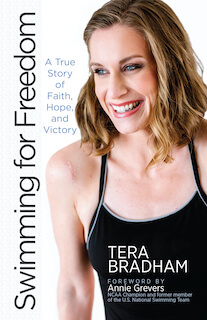
Swimming For Freedomn By Tera Bradham – Photo Courtesy: Tera Bradham and BroadStreet Publishing, LLC
My body contorted in a twisted fetal position to escape the pain pulsing down my arm. Tears slid gently down my cheeks in silent agony as the words refused to come. I did not have
the strength to pray on my knees; that was the position of a warrior. I had only the strength to crumple into the position of a baby. Sobs began to wrack my body. Relentless questions and doubts bombarded my mind, and my receding faith could not muster the strength to fight them.
No logic, wisdom, or truth seemed able to snatch me from the pit of despair that encompassed me on all sides. I sank deeper and deeper. There was no light, no hope, and no answer.
And then, amidst the suffocating anguish, a lone light, barely visible, shone through the darkness. Something from the recesses of my mind fought its way to consciousness: If you have the faith of a mustard seed, nothing will be impossible for you. The beacon of hope abated the tears long enough for me to begin to catch my breath.
Words caught in my throat as I uttered a desperately simple prayer. A prayer that I believe changed my destiny:
“God, I have fought for years and years and years, and I can’t fight anymore. I never thought this world could break me, but it has. And I’m finished. I know I said that your grace was sufficient for me, and I know that I said your strength was made perfect in my weakness, but I can’t do this anymore. I can’t live this way. Please don’t make me live this way. I have been hanging on by a kernel of a mustard seed of faith for years, and I don’t have it anymore. I have lost my life because I did what you told me to do. Where are you? Please don’t let me live this way.”
I paused as one final surge of conviction overtook my mind. I looked up to heaven, tears gathering and threatening to spill over in another torrent. I clenched my jaw with determination, and then I stressed each syllable as I made an audacious demand from an Almighty God: “Heal me or take me home, but don’t make me live this way.”
Curled up in a ball on my bed, begging for God to take me home, fighting thoughts of suicide, I had finally hit rock bottom. Maybe it took so long for me to get there because I had so far to fall.
I was born to prove people wrong. It was as if I could hear the conversations occurring outside the walls of my mother’s uterus, the voices of the doctors telling her I would never make it.
“Do not bond with this fetus,” they told her. “This pregnancy isn’t going to have a happy ending for you.”
Tears rose against her will as my mother fought for the unborn child in her womb. “She’s my daughter, not a fetus.”
“Well then, do not bond with her. She will never make it. We just don’t want to see you get your hopes up only to get hurt again.” The doctor tried to curb his blunt bedside manner, but the blow struck deeply.
My bedridden mother had hemorrhaged for the duration of her fourth pregnancy. She had already suffered two miscarriages, and endometriosis had overtaken her body in a vicious attack, pain- fully relocating and attaching her internal organs to her abdominal wall. Although she did not yet know it, both the endometriosis and tumors inside her uterus complicated this pregnancy.
After a successful pregnancy with my brother, doctors told my mom she should have an immediate hysterectomy. She refused, begging God for one more child. God answered, and I began to paddle around inside her. Now, doctors were telling her that this last hope of a second baby was futile.
Luckily for her and for me, God does not listen to the wisdom of this world. He makes his own rules. It would seem that while God knit me together in my mother’s womb, he wove an inextricable patch into the fabric of my being that would never depart: the passion to fight. Before my eyes glimpsed this precious earth and before my lungs filled with oxygen, God knew he would use me to prove the world wrong. He would use me to defy logic, convention, and the standards of others. He would use me to defy the world.
On May 1, 1993, at 12:21 a.m., I won my first battle against the expectations of this world. I was born. Against all odds, I wrig- gled my little form free and blinked up at the doctors who swore I would never be there. I may have been a month premature, but I made it. I was alive and kicking.
My parents had chosen the name Lindsey for me, but after seeing my frail little form of skin and bones without an ounce of baby fat, they decided I didn’t look like a Lindsey. Instead, they named me Tera Elizabeth: Tera meaning “tower of strength” and Elizabeth meaning “God’s promise.” Little did they know how those names would come to epitomize my life.
Trials surfaced from the get-go. Within my first few months of life, I looked with disgust on this strange place into which I was so unwillingly thrust. One tear duct would not quit producing a strange goop, and my eye was so full of slimy matter that I spent more time with my eye crusted shut than I spent with it open. Eventually, doctors conducted a tear-duct repair.
Wailing characterized my waking hours more than laughter. With the piece-of-cake infant my firstborn brother had been, my parents could only gawk at their new insomnia-induced lunacy. A few months after my tear-duct repair operation, my mother dis- covered a prominent lump protruding from my lower abdomen. Doctors took me in to the OR again but this time for a hernia repair. Afterward, I continued to cry in pain and unhappiness until one day, exactly sixteen months after I entered the world, I decided that earth was a habitable place. Much to the relief of my worn-out parents, I stopped crying and never returned to my old antics.
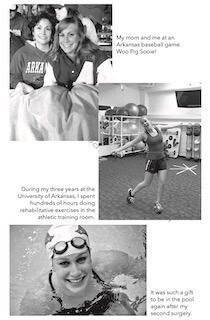
Snapshots from Swimming for Freedom – Photo Courtesy: Tera Bradham
Five months after my birth, surgeons performed my mother’s much-needed hysterectomy. The anesthesiologist’s eyes bulged above his surgical mask as he observed the damage the disease had wreaked on my mother’s body.
“How could this body have borne children?” The attending nurse asked in disbelief.
The surgeon looked up from his scalpel and shook his head. “How could this body have been walking?”
Water has always flowed through my veins. Neither of my parents swam growing up; my mom played tennis, and my dad wrestled. Yet somehow water found its way to my heart, pumping through me with each breath. I would swim in the water forever, and while I may have complained about my prune fingers and toes, I always dove back in.
Even when water didn’t surround my sunlit, blonde hair, I pretended it did. In kindergarten, I loved The Little Mermaid. In fact, I believed I could be a mermaid. I sang underwater and did my best to open my eyes to see through the pool. I had conversations with King Triton underwater and moved my imaginary tail in smooth undulations to propel myself through the water.
One day, I played on the stairs, entranced in my underwater, make-believe world. Fins were never great for land, and when one of my flippers slipped on the stairs, I heard a crack. Pain seared through my toe, and I deduced I must have broken it.
Mortified that my parents would find out about my amateur mermaid skills, I casually walked downstairs and told my mom, “I think I just broke my toe.”
“Sweetie, if you broke your toe, you would be crying hysterically.” I wasn’t sure what the word hysterically meant at that age, but the smirks of my dad from the kitchen confirmed my mom’s disbelief.
“I heard it crack!” I retorted with the vehemence of a stub- born five-year-old.
“Well, what were you doing?” she asked.
“Playing on the stairs,” I blushed.
My mom looked at me with suspicion and inspected the foot. Nothing looked amiss. “I’m sure you just stubbed your toe,” she reassured me.
Ten minutes later, my foot was black from my pinky toe up to my ankle. The doctor confirmed it the next day: I had broken my pinky toe.
That day proved two innate characteristics of my heart: First, I had a pain tolerance that exceeded the heights of Mount Everest. Second, I would gladly face that pain for the sake of water.
My toe healed, and I continued my exploits of algae and mermaid singing. One day at the neighborhood pool, I noticed my mom talking to the lifeguard during one of my breaches for air. The high schooler had been observing my brother and me swimming and asked her if we swam for the local club team, Texas Gold.
“What’s Texas Gold?” she replied.
“You mean your kids aren’t in USA Swimming?”
“What’s USA Swimming?”
“Lady,” he said, “you have two breaststrokers. You need to find a coach as soon as you can.”
It’s amazing how sixty seconds can change someone’s life.
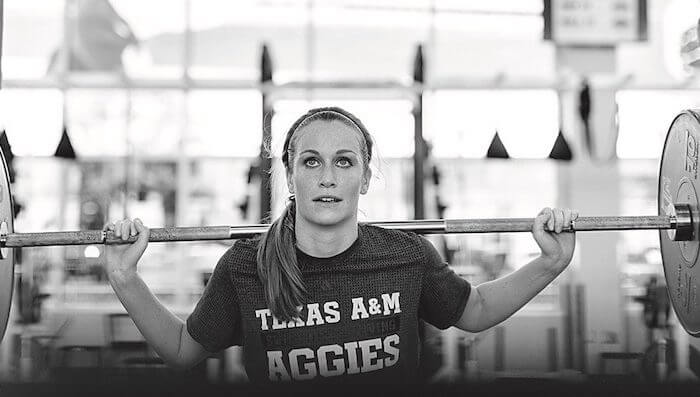
Aggies At World – Tera Bradham sets her sights on power in the pool – Photo Courtesy: Tera Bradham
One word spoken, positive or negative, can change someone’s eternity. To this day, I have no idea who that lifeguard was, but he changed the trajectory of my life forever. Because of his comment, I became a competitive swimmer.
Well, technically, my brother, Taylor, became a competitive swimmer. Taylor joined our local summer league swim team, the Georgetown Aquadillos. That year, I went to all his meets, coloring Disney princess pages (probably Ariel) and rummaging through his icebox of snacks. I was bored out of my mind. Sitting for hours watching him seemed like an enormous waste of time, so I decided I should just join him. And the next year, that’s exactly what I did. I joined the Aquadillos and asked my coach, Dale Huggins, every two laps what time it was.
“Time for you to get a watch,” he would reply.
I hated it. Swimming was cold. You couldn’t get out when you wanted. You couldn’t sit on the bottom of the pool and sing. You had to jump in freezing water and wallow in the frigid arctic while others finished or while you waited for your coach to give instructions.
I made my parents aware of the torture, showing them my blue lips every chance I got. In the pool, I spent my time saving ladybugs from dying and blowing bubbles while I sat on the wall. Somehow, I kept coming back. My parents never made me swim, and they were the opposite of helicopter parents, but we all realized something—I was good. Really good. And I loved winning more than I hated the cold.
With the way the age group system worked in summer league, I had the worst possible birthday. Ages were determined by the age you were on May 1, my birthday. If I had been born a single day later, I would have had another year in each age group. Instead, I was always the youngest a swimmer could possibly be.
Despite this, over the next three years I broke every record the Aquadillos had. My coach would shake his head and say, “She’ll be six feet under before those records are broken.” Oblivious to his comments, I simply loved the competition. The mother of one of my closest friends promised her a Barbie PT Cruiser if she beat me in the 25-yard Backstroke. My mom told me, and I buried my head in my towel in anger. She often beat me in the backstroke races, but I fumed from the audacity of someone being rewarded for beating me.
When it was time for the seven and eight-year-old girls’ 25-yard Backstroke, I demolished another record, touching the wall in 17.99 seconds. From the beginning, I knew how to channel anger. I subconsciously understood how it worked, and I took advantage of it. I knew I should be a good sport, but secretly, I longed for one of my competitors to talk smack to me. I would smile kindly and then talk my smack in the pool.
This intense competitiveness would bleed over into every aspect of my life. For years, my brother and I had begged our par- ents for a puppy, and we felt frustrated by their repeated denials. We asked what it would take for them to finally change their minds. Unbeknownst to us, Mom and Dad had carefully calculated how far away each of us was from our respective team records and set what they felt confident was an insurmountable goal because they were intent on maintaining a pet-free home. Pleased with their plan, they promised that if the two of us could combine for a total of six record-breaking swims, then we would get a puppy! Behind our backs, they laughed at the implausibility of such a daunting task.
Four weeks later, Taylor and I cooed as we cuddled Lexi, our new puppy, in the back seat as we drove home from Dallas. Our parents realized they were in over their heads and that my brother and I had more talent than a summer league program could foster. So at age eight, I began to swim year-round, and my world would never be the same.
What They Say About Swimming For Freedom:
Swimming for Freedom is a must-read for anyone who has participated in a sport or had a setback in life. Tera’s journey is the ultimate comeback story of someone who persevered in faith through impossible odds. – Josh Davis, three-time Olympic Gold Medalist
Swimming for Freedom shows how God can heal with just a mustard seed of faith. Tera’s story is proof that you can find so much more freedom in what he has planned for your life than what you have planned. Tera’s daily sacrifice to press into God’s voice will challenge you to do the same and find the freedom and healing God has for your life. – Bethany Galat, Silver Medalist at 2017 World Aquatics Championships
Athletes do amazing things when they want to reach their goals. Tera is one of those athletes and has the heart and mind of a champion. Despite her injury, she made all of us proud. – Steve Bultman, former US Olympic Coach, head coach, Texas A&M University
Tera is one of the most competitive athletes I have ever seen. I was one of the few who got to coach Tera before her injury, and her potential was limitless. Even though her potential fell prey to undiagnosed injuries, she overcame those setbacks and turned them into a story of triumph that will inspire the world. – Randy Reese, former US Olympic Coach
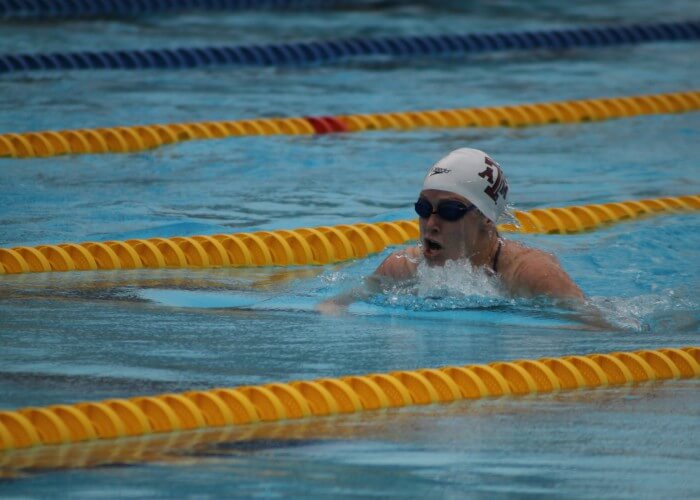
Tera Bradham, racing back in 2015 – Photo Courtesy: Andy Ringgold/Aringo Photos
In the forward, Annie Grevers, NCAA Champion and the former member of the U.S. National Swimming Team who headed Swimming World’s intern program for a while, writes:
“In Swimming for Freedom, you will come to know Tera’s tenacious spirit and her road to ultimate freedom, which might not resemble our worldly definition of freedom. Her story will help you see the light of hope through your own weighty circumstances.
“Whether you’re fighting through chronic pain physically, emotionally, or spiritually, Tera’s journey will meet you where you are, serving as an empathetic voice of encouragement as to what these trying circumstances could mean for your future. And even if you’ve reached a point of utter despair, she will remind you that no body, mind, or soul is beyond repair.”



